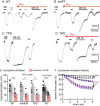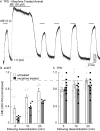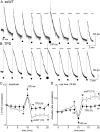Cellular tolerance at the µ-opioid receptor is phosphorylation dependent
- PMID: 29589831
- PMCID: PMC5873894
- DOI: 10.7554/eLife.34989
Cellular tolerance at the µ-opioid receptor is phosphorylation dependent
Abstract
Phosphorylation of the μ-opioid receptor (MOR) is known as a key step in desensitization and internalization but the role in the development of long-term tolerance at the cellular level is not known. Viral expression of wild type (exWT) and mutant MORs, where all phosphorylation sites on the C-terminus (Total Phosphorylation Deficient (TPD)) were mutated to alanine, were examined in locus coeruleus neurons in a MOR knockout rat. Both receptors activated potassium conductance similar to endogenous receptors in wild type animals. The exWT receptors, like endogenous receptors, acutely desensitized, internalized and, after chronic morphine treatment, displayed signs of tolerance. However, TPD receptors did not desensitize or internalize with agonist treatment. In addition the TPD receptors did not develop cellular tolerance following chronic morphine treatment. Thus C-terminal phosphorylation is necessary for the expression of acute desensitization, trafficking and one sign of long-term tolerance to morphine at the cellular level.
Keywords: Desensitization; Locus Coeruleus; internalization; neuroscience; opioid; phosphorylation; rat; tolerance.
© 2018, Arttamangkul et al.
Conflict of interest statement
SA, DH, JB, XS, JW No competing interests declared
Figures













References
Publication types
MeSH terms
Substances
Grants and funding
LinkOut - more resources
Full Text Sources
Other Literature Sources
Research Materials

